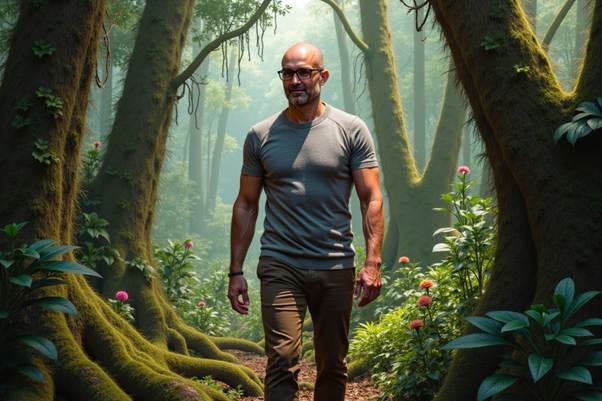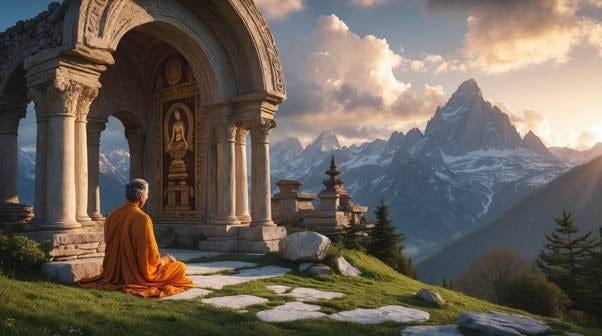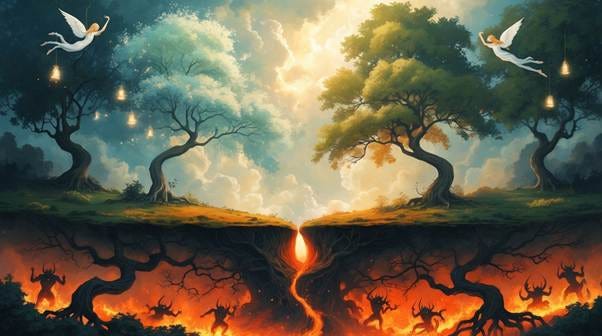Over a decade ago, I began a journey—turning away from fleeting pleasures in pursuit of deeper meaning. Immersing myself in the world’s spiritual traditions, I navigated a path that was anything but smooth. Countless pitfalls, mistakes, and detours tested my resolve. As an engineering student turned seeker, I discovered timeless truths that transcend cultures, shaping my understanding of life, personal growth, and the soul’s journey. Today, while balancing entrepreneurship, fatherhood, and the daily challenges of modern life, I see it all as part of an ever-unfolding adventure.
The Emptiness of Excess
At 19, I entered university to study engineering, stepping into a world of newfound freedom. My strict upbringing had kept me sheltered -no partying, no drinking, no drugs, no reckless abandon before 18. Looking back, I’m grateful for those boundaries, though they felt restrictive at the time. That first year at university, I dove headfirst into the typical college scene: parties, alcohol, and chasing what everyone else seemed to value. But by the end of it, I felt hollow.
The highs were fleeting, each pleasure dissolving into a void that left me questioning, Is this all life is?
The answer was clear: this wasn’t for me. The pursuit of temporary gratification felt empty, unfulfilling, and disconnected from any deeper purpose.
That realization became the catalyst for my spiritual journey. I began exploring mystical and spiritual traditions, seeking answers that could fill the void I’d uncovered.
A Tapestry of Traditions
My search took me across a vast landscape of thought. I studied Christianity, delving into its teachings of love and redemption, and Gnosticism, with its esoteric focus on inner knowledge. I explored Buddhism’s path to liberation through mindfulness and Hinduism’s intricate philosophies of the self and the cosmos. Rosicrucianism offered insights into universal mysteries, while Stoicism taught me resilience and the art of living in accordance with reason. More recently, I’ve been captivated by Carl Jung, a modern mystic whose work on the psyche bridges spirituality and psychology.
Each tradition offered unique perspectives, yet I began to notice common threads weaving through them all. These were practical guides for living with intention and depth.
Over time, I participated in various organizations and even so-called 'cults,' but my focus was never on dogma or ritual—though at times, I did explore them or temporarily get caught up in them. My ultimate goal was to seek a deeper meaning, a way to understand myself and my place in the universe in a practical and not theoretical way.
The Common Threads
What did these traditions share? At their core, they all emphasized self-knowledge. True spirituality, I learned, begins with looking inward - exploring the depths of your soul through everyday interactions. It’s about peeling back the layers of ego, fear, and illusion to uncover who you really are. This isn’t a one-time revelation but a continuous process, unfolding moment by moment. As Carl Jung eloquently said:
No tree can grow to heaven unless its roots reach down to hell
Another key lesson was taking responsibility for your life. Every challenge, every interaction, is an opportunity to learn. The concepts of karma and dharma, often misunderstood as cosmic punishment or rigid duty, became clearer to me as simple principles of cause and effect. They’re not about judgment but growth.
Your actions ripple outward, and the universe responds, creating circumstances - sometimes gentle, sometimes harsh - to teach you.
As Jung said, life is a mirror reflecting your inner world.
I also learned (most of the times) to see challenges as adventures. Instead of resisting difficulties, I began to view them as invitations to grow. This shift in perspective transformed my experience of life. A setback wasn’t a punishment but a chance to deepen my understanding.
The universe, God, or whatever you call the intelligence behind creation, is always orchestrating synchronicities - meaningful coincidences that guide you if you’re paying attention.
It’s not easy, but by shifting your perspective, you can see that life’s hard lessons prepare you for something greater - challenges you wouldn’t be equipped to handle without those experiences.
These hardships hold the power to transform you or break you, depending on how you respond. But at the end, this is your choice, your so called ‘free will’.
The Language of Signs
Life speaks to us constantly, but it’s up to us to listen. Early on, the signs are subtle: a recurring thought, a chance encounter, a gut feeling. If you’re observant and present, you can act on these nudges and avoid harder lessons. Ignore them, and the signs grow louder - maybe a conflict, a loss, or a crisis. Keep ignoring them, and life will deliver a wake-up call that forces you to confront what you’ve avoided.
These “hard lessons” aren’t punishments; they’re opportunities to learn and realign with your path.
I’ve experienced this first-hand. There were times when I ignored the quiet whispers of intuition, only to face consequences that could’ve been avoided. Each time, the lesson was the same: stay present, stay aware, and trust the process. It's challenging today, living in a society filled with distractions, each vying for our attention.
The pain of a hard lesson often holds the seed of transformation. With practice, you can learn to heed the subtler signs and navigate life with greater ease. It’s not easy - it requires constant effort - and sadly, in our youth or later as an adults, we’re rarely taught to approach life this way.
The Power of Presence
How do you stay open to life’s guidance? The answer lies in being present. All spiritual traditions, in one way or another, point to this truth. Whether it’s the mindfulness of Buddhism, the Stoic focus on the present moment, or the Christian call to constant prayer, the message is clear: life unfolds now.
The past is gone, the future is uncertain, and dwelling in either pulls you away from reality.
This doesn’t mean abandoning planning or reflection.
Planning is essential, but once it’s done, let go. Obsessing over what’s to come or regretting what’s been steals you from the richness of the moment.
Presence is like a muscle - it strengthens with practice. For me, it’s become a kind of constant prayer, grounding me in the here and now, where life’s beauty and lessons are most vivid. The more you practice this, the more you’ll attract kindred spirits and circumstances that foster growth, helping you navigate life’s challenges with greater resilience. And this is when you feel blessed and grateful and it is a sign that you are on the right path.
The Company You Keep

As I deepened my practice of presence and responsibility, I noticed a profound shift in my relationships. The old proverb says,
Show me your friends, and I will tell you who you are.
There’s truth in this. The more I committed to living with intention, the more I attracted kindred spirits - beautiful souls who shared a desire for growth and meaning. These connections weren’t superficial; they were mirrors reflecting my own journey, challenging me to stay true to my path. The company we keep shapes us, and surrounding myself with those who valued self-knowledge and resilience created a ripple effect.
The more you practice presence and take responsibility for your actions, the more you’ll attract people and circumstances that foster growth, helping you navigate life’s challenges with greater resilience.
Living with Intention
After more than two decades of exploration, I’ve come to see spirituality not as a destination but as a way of being.
It’s about living with intention, embracing responsibility, and staying open to the mysteries of existence.
The traditions I’ve studied aren’t competing dogmas, but different lenses through which to view the same truth: we are here to learn, to grow, and to become more fully ourselves. Choose the one that resonates with you, and follow your path.
Life will always offer challenges, see them as invitations. By staying present, observing the signs, and taking responsibility for our actions, we can navigate the journey with grace. The void I once felt has been gradually replaced by a sense of connection - not to some distant ideal, but to the living, breathing pulse of each moment.
It is an ongoing and painful at times process and not a magical switch!
In the end, spirituality isn’t about escaping life’s difficulties or chasing fleeting highs. It’s about diving into the depths of your soul, embracing the adventure, and trusting that the universe is always conspiring to help you grow. Two decades in (on and off), I’m still learning - and that, perhaps, is the greatest lesson of all.







A good quote relevant to this article by Victor Frankl:
"When a person can't find a deep sense of meaning, they distract themselves with pleasure"